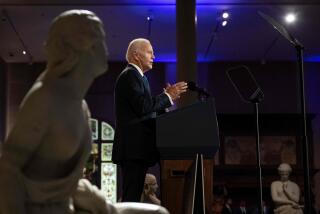PERSPECTIVES ON RUSSIA : Creating Enemies Where None Exist : We label Moscow’s opposing factions as ‘villains’ and ‘heroes,’ confusing their interests with our own.
- Share via
Once again, Russia is undergoing domestic crisis, and once again, U.S. officials and pundits declare that America’s future security demands that Russians choose America’s way out. Such an arrogant attitude toward the internal affairs of a foreign state is contrary to the best traditions of U.S. diplomacy and to America’s interests.
Confusing Russia’s business with our own, Washington’s policy-makers and foreign-policy experts blithely label the opposing Russian factions “heroes” and “villains.” Although officials announce perfunctorily that the United States will not interfere in Russia’s domestic politics, they then go ahead and do just that.
President Clinton declared Tuesday that the forces of democracy and reform, which he identified with Russian President Boris Yeltsin, were the good guys, whom the United States would support against their foes (the “conservative” Russian Parliament), who, by virtue of their opposition to the good guys, are construed as wishing America harm. And hours later, Secretary of State Warren Christopher asserted that the triumph of Yeltsin’s forces was a matter of primary importance to America’s national security.
This view of Russia’s predicament, and our stake in it, is dangerously misguided. Russia’s crisis cannot be neatly translated into American terms. It is not the result of nefarious political intentions, nor of a poor understanding of free markets and democracy, nor of baneful “hard-line” influences, but of deeply rooted traditions and intractable circumstances that are distinctly Russian.
Moreover, it is distorting and insulting to declare that America’s security depends upon the outcome of Russia’s internal agony. If Moscow fails to democratize properly, so the thinking in Washington goes, Russia could revert to its “nationalist” ways, thereby apparently posing a security threat to America. But the debate in Russia today does not concern its foreign policy, rather Russians are grappling with defining their fundamental domestic character. There are many Russian “conservatives,” for example, who strongly desire good relations with the United States, but who, like the Speaker of the Russian Parliament, Ruslan I. Khasbulatov, are nevertheless profoundly unsettled by the prospect of a “Westernized”--that is a liberal, democratic and capitalist--Russia. To so “reform” Russia, many there believe, would be to transform it into a chaotic, selfish and purposeless commercial society.
For American statesmen to characterize those Russians who hold these views, so different from our own, as ipso facto our “enemies” is to create enemies where none now exist. For President Clinton to warn, as he did in March, that America must increase its defense spending if Russia fails to choose the path of economic and political development that we wish it to follow, and for Christopher to assert that a Russian embrace of democracy and a market economy is “the only basis for the U.S.-Russian partnership,” is to dictate to a sovereign power the internal arrangements that we find acceptable.
In fact, speaking about U.S.-Russian relations, the President made the astonishing assertion that we should make other states’ domestic affairs our concern. According to Clinton, America’s foreign policy must now “focus on relations within nations, on a nation’s form of governance, on its economic structure, on its ethnic tolerance.” Such an overbearing and crude intrusion in Russia’s internal affairs betrays the dangerous belief that America will only be safe when we have made the world very much like America.
Rather than treat the Russians as wayward children who must be cajoled and converted until they conform to our image, America should practice the same non-interference toward Russia we wished other states had accorded America during our own civil struggles. In short, the United States should treat Russia as an adult capable of making up its own mind. Whatever internal economic and political systems the Russians eventually adopt, America should make very clear which external actions it will perceive as threatening. But we should make equally clear that Russia’s internal struggles are its business alone.
More to Read
Sign up for Essential California
The most important California stories and recommendations in your inbox every morning.
You may occasionally receive promotional content from the Los Angeles Times.













